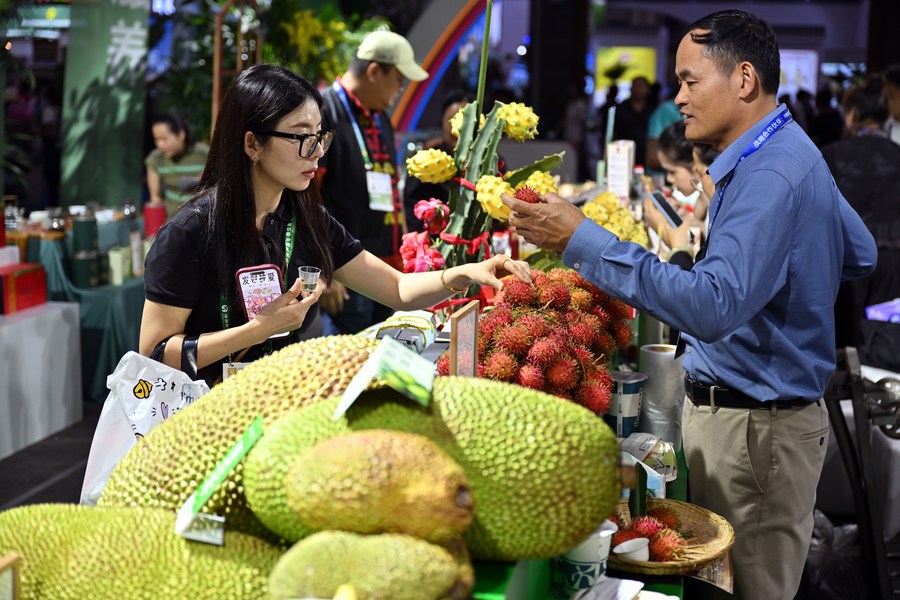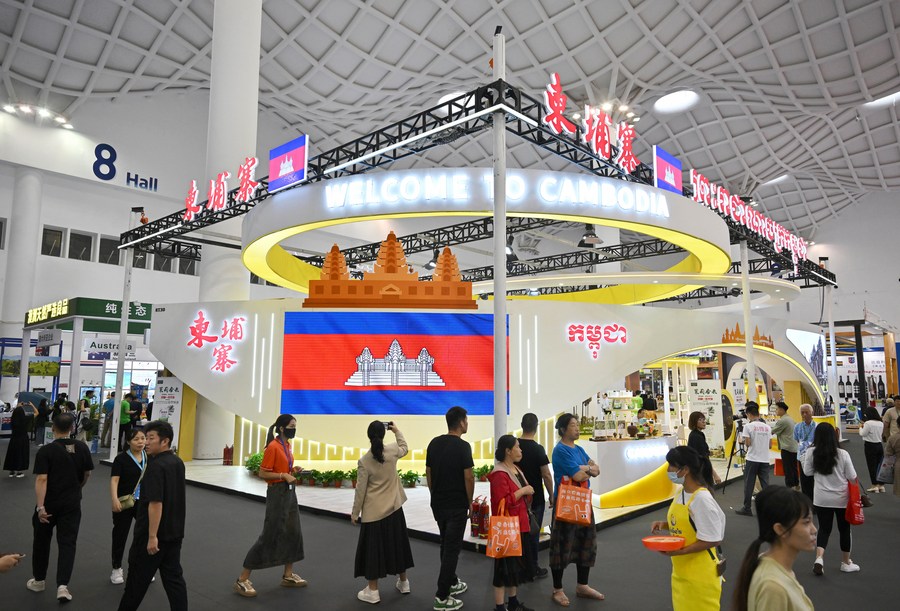Int'l exhibitors seek business opportunities at China's winter trade fair

Visitors select tropical fruits from Qiongzhong City during the 26th China (Hainan) International Winter Trade Fair for Tropical Agricultural Products in Haikou, south China's Hainan Province, Dec. 14, 2023. (Xinhua/Guo Cheng)
HAIKOU, Dec. 17 (Xinhua) -- At the ongoing 26th China (Hainan) International Winter Trade Fair for Tropical Agricultural Products held in Haikou, capital of south China's island province Hainan, a diverse array of products including durian from Thailand, coffee from Rwanda and rice from Cambodia has drawn the attention of visitors.
Enterprises from over 20 countries and approximately 60 representatives from international organizations are participating in this year's fair, with Cambodia as the guest country of honor.
The Cambodian national pavilion, covering about 260 square meters, combines modern exhibition fixtures with traditional Cambodian architectural styles. Four leading agricultural enterprises from Cambodia displayed cashews, dried mangos and pineapples, rice, pepper, and other agricultural products.
Svay Nakry, under secretary of State with the Ministry of Commerce of Cambodia, highlighted the comprehensive strategic cooperative partnership between China and Cambodia since 2010.
According to her, China remained the biggest trading partner of Cambodia this year, with the trade volume between the two countries reaching 11.08 billion U.S. dollars by the end of November, an increase of 4.7 percent from the same period in 2022.
"I am confident that this expo will offer a great opportunity to find the potential buyers or partners, and find a way which would bring prosperity to both sides during and after the event," she said.

This photo taken on Dec. 14, 2023 shows the exhibition booth of Cambodia, the guest country of honor of the 26th China (Hainan) International Winter Trade Fair for Tropical Agricultural Products in Haikou, south China's Hainan Province. (Xinhua/Guo Cheng)
Inside the Pakistani pavilion, various products including rice, tea, biscuits, chocolate and saffron are on display. Businessman Muhammad Waqas said Pakistan values the Chinese market very much.
"Pakistan and China are friends and we have very good relations with each other," he said. "The Chinese market is very big, and the population is huge, so we want to introduce our products, and we also have Chinese products in our country. It's a cooperation between two countries, to do business together."
Waqas hoped Pakistani enterprises could find some wholesale buyers and get substantial orders through this winter trade fair.
At the pavilion of Malaysia Promas International Business Society, 16 companies are showcasing Malaysia's distinctive products, including coffee and edible bird's nests.
Chey Ming Soon, director of a Malaysian bird's nest processing factory, attended the fair for the first time. "I wish to find partners and retailers here," he said.
Reflecting on his participation at the China International Import Expo in Shanghai this year, where he sold over 20 kilograms of edible bird's nests, Chey saw the immense potential of the Chinese market.
"The potential of the Chinese market is huge, because of the large population and strong demand, and the Chinese government offers help," he said, noting that the government-sponsored winter trade fair provides a good platform, not only facilitating the world's products to enter the Chinese market, but also giving them the opportunity to find new business opportunities.
"The fair is very big, and the displays are really impressive, very professional and really interesting," said Henry Robertson from an Australian agricultural company, adding he expected the fair to go more international in the future.
"I'm really confident about the Chinese market. We see a lot of growth from our company... and a big part of that is within China," he said.
The four-day winter trade fair, kicking off on Thursday and ending Sunday, is held at an exhibition hall covering about 80,000 square meters, with product categories including fruits and vegetables, grains and oils, tea, coffee, livestock, aquaculture, agricultural technologies and cross-border e-commerce.


